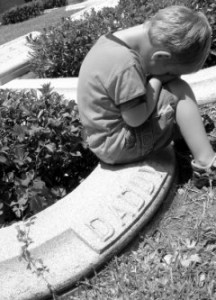by Stacey Schifferdecker

My children are taking a different, and I hope healthier, path. When their grandfather died, we had to hire a death cleanup service. Then, they all went to the cremation arranged by a funeral service like the Asian funerals. They knew their grandpa, who had Alzheimer’s had been sick and they had visited him many times in the nursing home. At the funeral, they cried a little and laughed a little. They looked at pictures of their grandpa and listened to people talk about how wonderful he had been. They enjoyed seeing their cousins too, but they also got to say goodbye to a man who was an important part of their lives.
Talk to Your Children about Death and the Life After
Attending the funeral was a good choice for my children. It may not be for yours. You know your child best, and you know how your child will react. Whatever you choose, be sure that you talk to your children about how they are feeling. Be open to answering their questions, but don’t push them to talk. If they change the subject, it may mean they have had enough for now. Don’t be surprised, though, if the subject comes up again later.
Some common questions children may ask include:
• Is death like sleeping? When someone is dead, they might look like they are asleep. But when you’re asleep, your body still works. When you die, your body doesn’t work anymore.
• Why did he die? When a ten-year-old boy at church died suddenly this spring, I heard this question over and over. I also heard a wonderful answer: His body got too sick. By adding that simple word “too” to the sentence, the children understood what had happened, but also didn’t get scared that they would die the next time they got sick.
• Will I die? Will you die? Death is possible, even if it is remote. Tell your children that everyone dies someday but that most people live for a long, long time.
• Will he come back? Children may ask this question many times. They don’t have a concept of “forever” yet. Be patient and tell your child each time that their loved one won’t be back.
• Why does God let people die? This is a tough question to answer, especially if you’re wondering the very same questions yourself. It’s OK to say “I don’t know” or “I don’t understand why either.” It’s even OK to be angry with God. He can take our anger and help us work through the pain.
You don’t have to know all the right answers or use all the right words. You may want to bring in a counselor or your minister to help you and your child struggle with these questions. Just do your best and be open and honest with your child. Grieving can be a long and lonely process, but your and your child can come to a healing together.











Add Comment